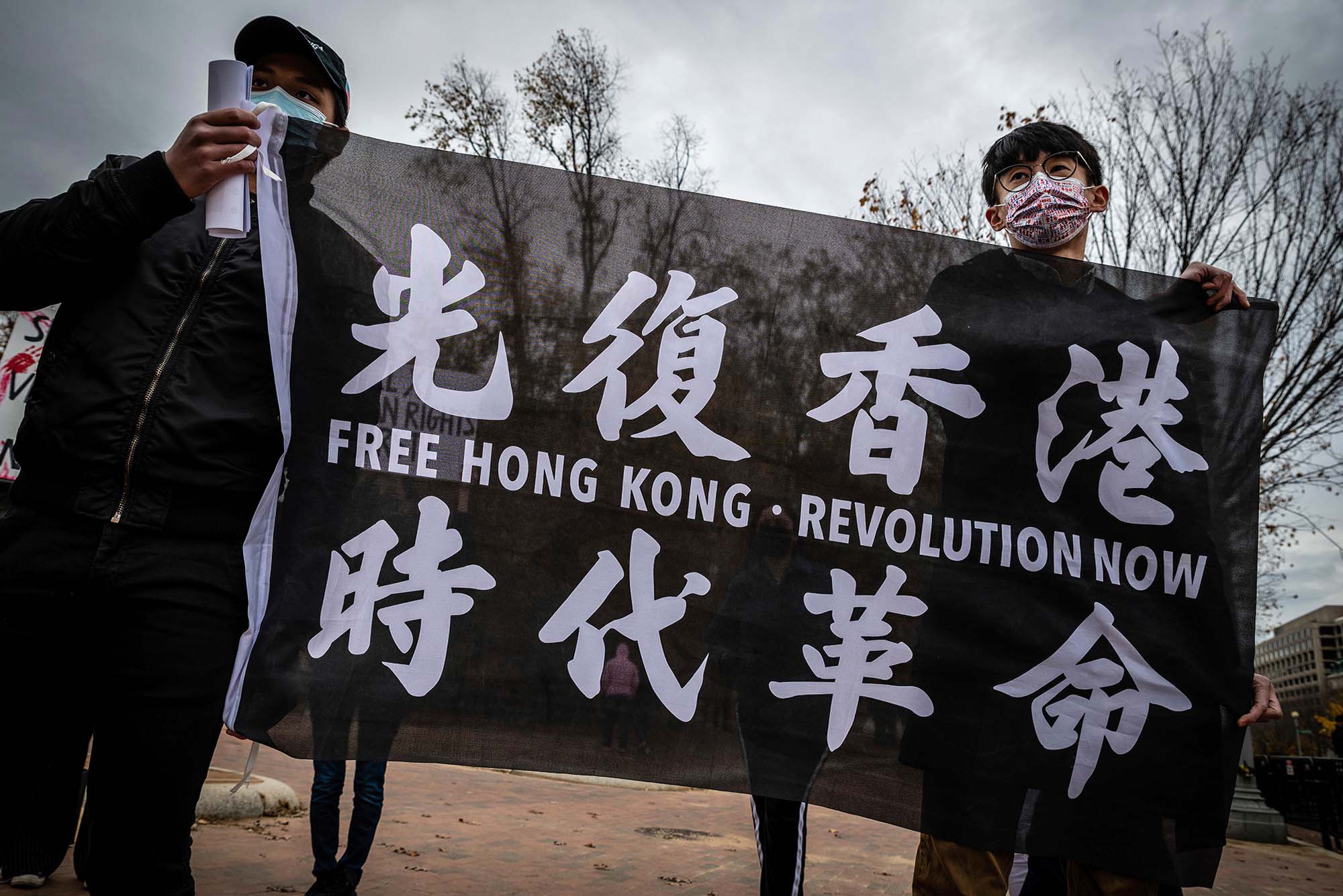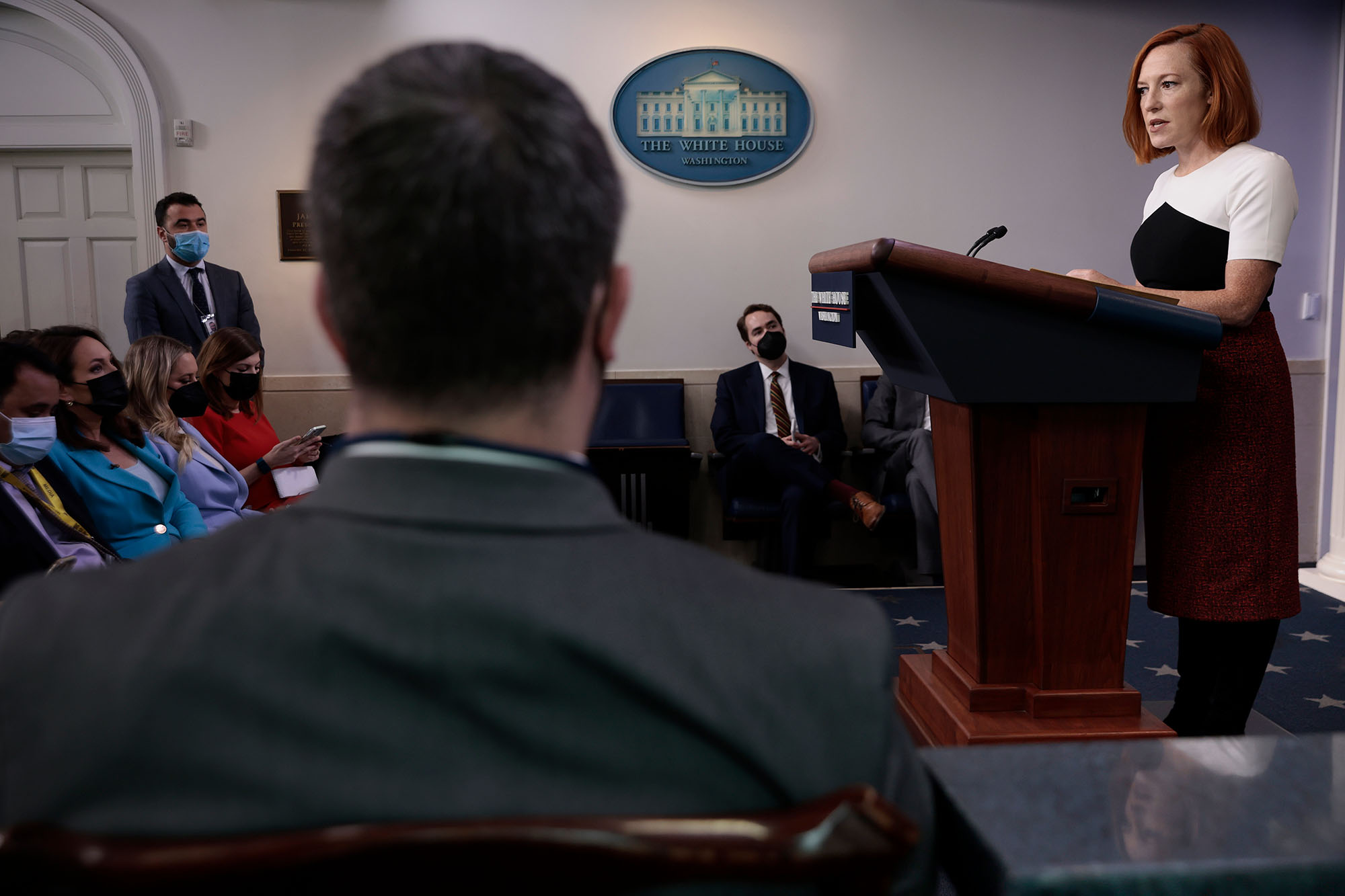BU Scholars Disagree on Whether US Diplomatic Boycott of Beijing Winter Olympics Is the Best Way to Protest Human Rights Abuses
BU’s Joshua Shifrinson says yes, BU’s Joseph Fewsmith says no

Uyghur Muslims joined Hong Kong democracy advocates outside the White House last month, both protesting Chinese President Xi Jinping’s human rights abuses. Photo by Alejandro Alvarez/Sipa USA (Sipa via AP Images)
Is the US Diplomatic Boycott of Beijing Olympics over Human Rights Abuses Wise?
BU’s Joshua Shifrinson says yes, BU’s Joseph Fewsmith says no
Chinese officials denounced “politicizing sports” after the United States announced on December 6 its diplomatic boycott of the Beijing Winter Olympics to protest China’s human rights abuses. US athletes will participate in the February games, but the country’s diplomats and officials won’t be there to cheer them on.
US leaders have condemned alleged internment and torture of Uyghurs and other Muslims in the Xinjiang region, and China’s suppression of democracy protests in Hong Kong. New Zealand joined the American boycott and Australia and the UK are weighing skipping the games.
The boycott is less extreme than the 1980 US Olympics protest, which kept American athletes out of the Moscow games after the Soviet Union invaded Afghanistan. Nevertheless, the Chinese social media platform Weibo censored searches for “US diplomatic boycott of Beijing Winter Olympics” this week. But Uyghur rights groups cheered the boycott. While China last year said the camps holding the Uyghurs were for “vocational education and training,” PBS’s Frontline, which filmed undercover inside Xinjiang, described “the largest mass incarceration of an ethnic group since the Holocaust.”
Will the boycott work or backfire? BU Today asked two Pardee School of Global Studies scholars: Joshua Shifrinson, an associate professor of international relations and an expert on diplomatic history and international security, and Joseph Fewsmith, a professor of international relations and political science, who regularly travels to China as an expert on its foreign policy and domestic politics.
Q&A
with Joshua Shifrinson and Joseph Fewsmith
BU Today: Do you believe a boycott is warranted?
Shifrinson: Given China’s increasingly repressive policies at home and assertiveness abroad, a diplomatic boycott is a very reasonable approach. It splits the difference between boycotting the Olympics entirely—something the United States rarely does, and an act which would have broader and potentially negative repercussions on US-China relations, or calling for the cancellation of the event—and acting as if nothing is happening. It’s an appropriate and largely symbolic gesture, though one which may still invite Chinese retaliation.
Fewsmith: As I see it, Sino-US relations have deteriorated sharply in recent years. When you find yourself in a hole, the first thing to do is to stop digging, and I don’t see any sign that the United States or China is going to stop digging. A diplomatic boycott is a symbolic gesture that accomplishes nothing. It is not a policy. I see nothing wrong with, say, the ambassador—or chargé d’affaires, since ambassador-nominee R. Nicholas Burns has not yet been confirmed—representing the United States at the Olympics. Being provocative without adopting a clear-cut policy aim accomplishes nothing.
BU Today: China’s government is outraged over the boycott. Will the boycott have any practical effect on the government’s behavior, or cause it to dig in its heels on its human rights policies?
Shifrinson: There are two different issues here: will the boycott affect Chinese policy in general, and what might it do in retaliation? On the first, I suspect the boycott will have little effect on China’s overarching behavior. In the Chinese government’s perspective, its problematic civil liberties and human rights record services Chinese national security and priorities. A symbolic move by the United States is thus unlikely to affect China’s overall behavior one way or another. That said, I expect China to retaliate in a similarly symbolic way in the future by, for instance, imposing additional restrictions on US sports teams playing in the country.
Fewsmith: As my first response implied, I think a diplomatic boycott will simply make China even more difficult to deal with. Moreover, it reinforces the Chinese position that the United States is trying to “hold China down.”

BU Today: Should the United States consider a total boycott and not allow its athletes to compete in the Olympic Games?
Shifrinson: No, I do not think a total boycott is warranted. The point of the Olympics is to showcase individual athletic prowess. It’s supposed to be a venue with nationalism as pushed to the side as possible. Of course, it’s impossible to entirely exclude it. Nevertheless, the United States has participated in such Olympics as the 1936 Olympics, held in Germany, and the 2014 Sochi games. Pulling all participation would thus be a way of saying that the United States considers China more egregious than Nazi Germany—this may be the case, but it’d be a major and public move that the United States might have a hard time walking back, and [might] limit US options if the situation in China worsens. Pulling diplomatic representation while letting the games continue strikes me as in keeping with the spirit of the event and an option that leaves the United States maneuvering room for dealing with China going forward.
Fewsmith: I do not think a total boycott would accomplish anything. But in the wake of the Peng Shuai case, I could imagine some athletes boycotting or protesting in some fashion. [Chinese tennis star Peng Shuai disappeared for several weeks after accusing a former vice premier of China of sexual assault on November 2. China responded with photos and videos of Peng, but some tennis officials and human rights advocates haven’t been mollified.]
BU Today: Ultimately, is there any other policy that countries might pursue to materially help the Uyghurs and Hong Kong?
Shifrinson: Unfortunately, assisting the Uyghurs and Hong Kong is very difficult. Publicly denouncing China’s moves can even be counterproductive by feeding China’s narrative that foreign countries are trying to exploit any internal Chinese divisions, a claim that China uses to justify its repression. For now, the best that can be done is to continue raising the issue through dialogue and applying pressure on Beijing economically and diplomatically. Pursuing a more stable and cooperative relationship with Beijing might also help—after all, the United States actually made headway with the USSR in the USSR’s treatment of its internal Jewish dissidents by improving relations with Moscow, despite Moscow’s awful human rights record. It’s possible similar engagement with Beijing might, paradoxically, help today.
Fewsmith: Turkey and Muslim countries should protest the Uyghur situation in Xinjiang. The United States should continue to call attention to it and boycott the purchase of cotton from Xinjiang, but there is little we can do to materially help the Uyghurs. Much the same is true in Hong Kong, but the business environment there perhaps encourages some—but unfortunately little—restraint there.

Comments & Discussion
Boston University moderates comments to facilitate an informed, substantive, civil conversation. Abusive, profane, self-promotional, misleading, incoherent or off-topic comments will be rejected. Moderators are staffed during regular business hours (EST) and can only accept comments written in English. Statistics or facts must include a citation or a link to the citation.